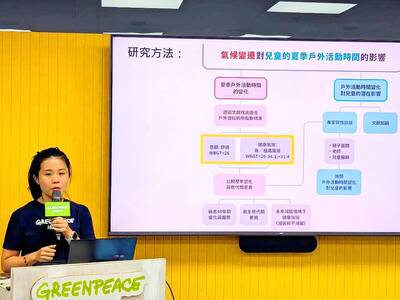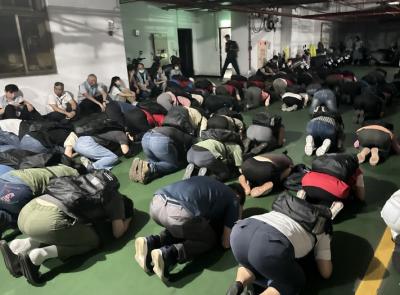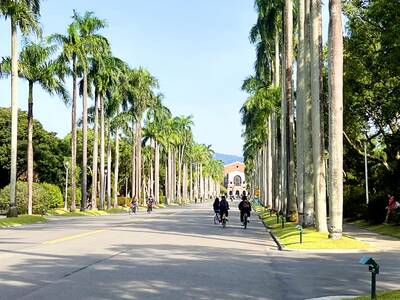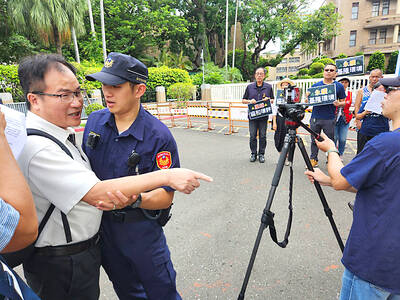Taiwan is indispensable to regional and global security, and is a reliable partner that would not be shaken by threats or coercion, former president Tsai Ing-wen (蔡英文) said in a lecture to students and faculty at the University of Cambridge on Friday.
After visiting Denmark to speak at the Copenhagen Democracy Summit on Tuesday last week, Tsai arrived in the UK on Thursday to meet with members of the British parliament and gave a lecture titled “Defending Democracy in the New World Order” at University of Cambridge’s Centre for Geopolitics on Friday.
Past assumptions about alliances and the role of major powers are being questioned, while authoritarian threats loom larger than ever, so democracies must be even more committed to tackling the challenges of a shifting world order, which would require wisdom from leaders and collaboration from the whole of society, Tsai said.

Photo: CNA
Authoritarian regimes remain in power due to their undemocratic nature, and with democratic backsliding, they are becoming stronger and more confident, she said, adding that they are colluding in pursuit of their self-interest and expansionist agendas, and influencing politics in democracies.
It is time to adapt, as the rules for engagement have changed, Tsai said.
Democracies’ collective strategy must also evolve, she said.
“Authoritarian aggression should not be encouraged, and compromises with authoritarians would only embolden more aggressive behaviors and demands,” Tsai said.
Democracies cannot secure peace through compromising with authoritarians, as it just makes them more daring, she said, citing lessons learned from World War II.
“A strong and united democratic front is required to deter authoritarians that are threatening our security and democratic way of life,” Tsai said.
Democracies must now navigate a new world order, as the decades-old trade and economic relationships, and security alliances are in critical need of rebalancing and redistribution of responsibilities, she said.
US President Donald Trump and his administration have been calling for their democratic allies to take greater responsibilities and invest more in regional security — a reminder for democracies to work even harder together to safeguard their collective security, Tsai said.
Democracies are undergoing a readjustment process to increase individual and collective capabilities, and redistribute responsibilities among partners, she said.
“While authoritarian regimes are working with each other to further their expansionists’ agendas, democracies need to be even more united,” Tsai said.
“Defending democracy has a price, and it would not be a free ride for anyone,” she said. “In this case, Taiwan stands ready to be a partner and contribute to making us more resilient amidst these challenges.”
Taiwan knows resilience well, as it has experienced authoritarian rule in the past and now faces intensified threats and intimidation from across the Taiwan Strait from people who seek to exploit the imperfection of democracy, Tsai said.
China thinks that by using military intrusions and cyberattacks, Taiwanese would be debilitated by fear, but Taiwanese have built resilience instead, she said.
The nation has over the past eight years built resilience on multiple fronts, including continued efforts to improve defense capabilities, Tsai said, adding that Taiwan has also fortified its digital infrastructure to withstand cyberattacks, and coordinated with civil society and international corporations to counter disinformation and cognitive warfare.
“Taiwan is indispensable to regional and global security, not only because Taiwan is a major contributor to global supply chains and technology products, but [because] of [its] strategic importance,” she said.
“Without Taiwan, the region will be less secure and less defendable. Democracies like the US, Japan and South Korea will perhaps invest even more in the region to counter China,” she added.
As the world order undergoes transformation, Taiwan would remain a steadfast partner to the international community, and its reliability is not measured by slogans, but by its actions even in the presence of extraordinary pressure, Tsai said.
“Democracy, resilience and partnerships are the foundation of our collective future,” she said. “Threats and coercion will never shake Taiwan’s determination to engage and contribute to the world.”

The government should improve children’s outdoor spaces and accelerate carbon reduction programs, as the risk of heat-related injury due to high summer temperatures rises each year, Greenpeace told a news conference yesterday. Greenpeace examined summer temperatures in Taipei, New Taipei City, Taoyuan, Hsinchu City, Taichung, Tainan and Kaohsiung to determine the effects of high temperatures and climate change on children’s outdoor activities, citing data garnered by China Medical University, which defines a wet-bulb globe temperature (WBGT) of 29°C or higher as posing the risk of heat-related injury. According to the Central Weather Administration, WBGT, commonly referred to as the heat index, estimates

Taipei and other northern cities are to host air-raid drills from 1:30pm to 2pm tomorrow as part of urban resilience drills held alongside the Han Kuang exercises, Taiwan’s largest annual military exercises. Taipei, New Taipei City, Keelung, Taoyuan, Yilan County, Hsinchu City and Hsinchu County are to hold the annual Wanan air defense exercise tomorrow, following similar drills held in central and southern Taiwan yesterday and today respectively. The Taipei Mass Rapid Transit (MRT) and Maokong Gondola are to run as usual, although stations and passenger parking lots would have an “entry only, no exit” policy once air raid sirens sound, Taipei

Taipei placed 14th in the Quacquarelli Symonds (QS) Best Student Cities 2026 list, its highest ever, according to results released yesterday. With an overall score of 89.1, the city climbed 12 places from the previous year, surpassing its previous best ranking of 17th in 2019. Taipei is “one of Asia’s leading higher-education hubs,” with strong employer activity scores and students “enjoying their experience of the city and often keen to stay after graduation,” a QS staff writer said. In addition to Taipei, Hsinchu (71st), Tainan (92nd), Taichung (113th) and Taoyuan (130th) also made QS’ list of the top 150 student cities. Hsinchu showed the

Environmental groups yesterday filed an appeal with the Executive Yuan, seeking to revoke the environmental impact assessment (EIA) conditionally approved in February for the Hsieh-ho Power Plant’s planned fourth liquefied natural gas (LNG) receiving station off the coast of Keelung. The appeal was filed jointly by the Protect Waimushan Seashore Action Group, the Wild at Heart Legal Defense Association and the Keelung City Taiwan Head Cultural Association, which together held a news conference outside the Executive Yuan in Taipei. Explaining the reasons for the appeal, Wang Hsing-chih (王醒之) of the Protect Waimushan Seashore Action Group said that the EIA failed to address